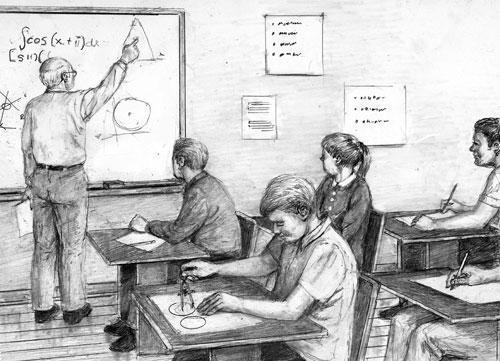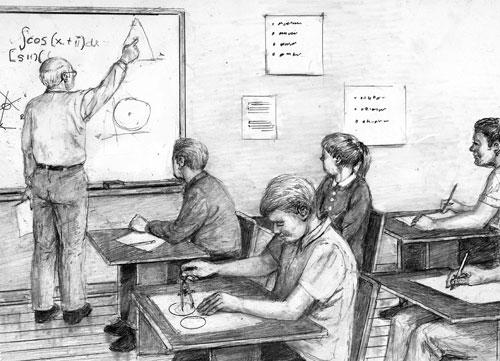By John Silveira
We send generations of American children to school hoping we’re preparing them for adulthood. Among the least of our expectations are that they’re going to be able to read, spell, write, and solve rudimentary math problems. How competently the schools perform this mission has been a matter of debate for decades. But for a large percentage of students, the schools seem to be failing them.
But I’m going to say that, even if we succeed in teaching these core subjects, we’re still shortchanging our kids. There are everyday things besides “readin’, writin’, and ‘rithmetic” they should have to master before they become adults, but we’re not teaching them.
I’m going to start with something simple: How to balance a checkbook, with or without a calculator or computer, so if you bounce a check you know why. Some business classes may teach this, but it’s a skill every student should have.
Next, everyone should be taught how to create a budget. You should learn this even if you decide not to budget, so that when you screw up you know how it happened and whose fault it is.
Given the likelihood that today’s young will not collect anything meaningful from Social Security (my generation will use up most of the money left in this underfunded system), they should learn what a personal retirement plan is and why it’s important to have one. It should be drilled into them that saving in the early years is more important than in the later years due to the powerful force of compound interest. They should also be taught about different savings plans — CDs, 401ks, IRAs, and whatever else comes along.
You want to teach them an everyday skill? Teach them to cook. We eat every day. Given all the complaints about fast food, the cost of food, and the effects poor eating habits have on our health, teaching students to cook should be a no-brainer. Whether they make use of the skill is up to them. A high school class in basic cooking would have been a godsend to me when I was a young bachelor. I would have been eating more than pizza and Froot Loops.
Majoring in hobbies
We live in a time when young people go off to college and major in subjects that are really “hobbies.” When they graduate, many find themselves drowning in student loan debt and unable to get decent jobs in their “fields.” There’s nothing wrong with getting a degree in sociology, political science, transgender studies, etc., as long as it’s an informed choice and the 17- and 18-year-olds understand their employability options will be severely limited.
Trade schools & entrepreneurships
And talking about college, there’s a faulty mode of thinking that college should be every high school student’s goal. It shouldn’t. There’s a vast number of trade schools and apprenticeships that students should consider. They can lead to greater job satisfaction and more money than most college graduates are going to experience. An education in a trade is almost certain to be acquired with far less debt (if any) than a college degree, and those who go through trade schools and apprenticeships are more likely to be employable for the rest of their lives. If they choose to start their own businesses, it’s easier to do with a “trade.” Also, if being independent is important to them, they’re going to have more job satisfaction.
Along with this, there should be a class in which local businessmen and tradesmen are invited to speak to explain why they’re self-employed and how they got that way. This should be coupled with a class in entrepreneurship. Such a class would accomplish two things. It would teach them anyone can start a business, whether it’s a dotcom business or a hotdog cart they want to push though Central Park. It will also teach them the incredible number of regulatory hoops politicians and bureaucrats have put in their way. Some of these regulations may be for public safety, but others are part of the empire building that bureaucracies naturally do. Still others have been lobbied for by established businesses and put in place to stifle competition from startups such as themselves. By the time students graduate from high school, they should be aware of the regulatory jungle waiting for them, whether they’re going into business or not.
The poor may benefit from a class in entrepreneurship more than anyone. Decades ago I read about an urban New York City teacher trying to teach English or history or some other “core” class that none of the students were interested in. He could barely control his class full of minority students, but one day he offhandedly remarked that he operated a few small startup businesses on the side. After that, the students hounded him to tell them how he started his businesses, and it took him weeks to realize they didn’t want to know who Shakespeare was or what the significance of the year 1066 was. What they really wanted to learn about was how to start a business. The kids, most from disadvantaged families, didn’t want to be unemployed, flipping burgers, or running drugs. They wanted to escape poverty by starting their own businesses.
What is in the Constitution?
This next one is a sore spot with me: What is in the U.S. Constitution? Kids aren’t taught that the Constitution is the blueprint for our federal government. They should be aware when the Constitution is being ignored by Presidents and congresses, governors and legislatures. Maybe it’s okay it’s being ignored, but how will they know this unless they know what’s in it? They should also understand that the Constitution cannot be changed by reinterpretation, as is often done in the courts today. They should realize that the Constitution does not belong to the experts, the President, the Congress, or even the courts. It’s there for the American people, and changes should always come via one of the two amendment processes dictated by Article V, either the amendment process or a constitutional convention.
They should also know what’s in the Bill of Rights — and what isn’t — so they understand that the Constitution is not the source of our rights, nor are our rights a gift from our government, including the Founders themselves. Our nation was set up with the idea that we have rights simply because we’re human. So, when the Congress or the courts modify our rights, we should realize what they are taking away (because they’re rarely, if ever, expanding them).
Here’s a good class project: The class should read the 9th Amendment, which says, “The enumeration in the Constitution, of certain rights, shall not be construed to deny or disparage others retained by the people.” The students should then compose a list of what those other rights, not mentioned in the Constitution, might be. They might also be asked if they think a so-called right is really a Natural Right if someone else can be forced to provide it. Compare health care, which has to be provided by your fellow citizens, as opposed to the freedom of speech, which doesn’t. Many of the “rights” politicians promise voters today can only be supplied because something is taken away from someone else, by threat of force. What they are generally taking is money in the form of taxes, but sometimes it’s the use or control of private property.

Jury nullification
Students should understand that when they are impaneled on a jury, they are the most powerful people in the courtroom. Why is this important? The United States has more laws than any civilization in history, and our country, the “land of the free,” now imprisons more people than any country in the world, and at a higher rate than any country in the world. Citizens should be aware that, when sitting on a jury, they are allowed to nullify bad or misapplied laws, even if instructed that they can’t by the judge, even if they swear they won’t. Perhaps if people begin realizing they can — and should — vote their consciences when sitting in judgment of others, we can start nullifying bad laws and free hundreds of thousands of people now trapped in the legal system for victimless or consensual crimes. I can think of very few things a student could learn that would make for a better society than jury nullification.
The U.S. dollar
It should also be taught that our currency is created out of thin air and that, though the United States used to have its own currency, the currency we now use belongs to a private organization called the Federal Reserve, which is made up of bankers, and that the Federal Reserve is not part of the United States government, despite the word “federal” in its title. They should know that the Chairman of the Federal Reserve is one of the most powerful people in the country but is not elected and is not accountable to the American people. For some reason, none of this is taught in our schools.
Taxes
Students should learn how much we’re actually taxed. Taxes don’t just come out of our paychecks. They’re included in everything we buy. When corporations are taxed, the corporations have to pass those taxes on to the consumer; otherwise, they’ll go out of business. We should learn these simple facts in high school, so when a politician promises to pay for something by upping corporate taxes, he’s really taxing us. A good class project would be to figure out how much in taxes their families pay, and this should include not only income taxes, but sales taxes, excise taxes, and even their share of the taxes corporations collect that are part of the price we pay for almost everything we buy. It wouldn’t be easy to get all this information (government, at all levels, doesn’t want it to be easy) and the students (and perhaps their parents, too) would be astounded.
Where our taxes go. Cases can be made for many tax expenditures, but there are many others that are questionable, such as corporate subsidies. When a corporation is subsidized with our tax dollars, we are being forced to pay for their products or services, even if we don’t use them. Subsidies give unfair advantages to established businesses that make it difficult for businesses with innovative and better products and services to survive. In other words, subsidies come at a cost to the consumer by making it more expensive for innovations to succeed in the marketplace.
What is capitalism?
There should be a class teaching what capitalism is — and is not. Laissez-faire capitalism is supposed to allow consenting adults to meet in the marketplace and freely purchase goods and services either with barter or with money. Crony capitalism is when the government favors one business over another, thereby giving the one advantages through regulations, taxes, or both.
Last, before they graduate, students should understand the meaning of the phrase, “There’s no such thing as a free lunch.” When you get something free, someone else worked to produce it. Even “free” money given by the government was either taken from a taxpayer who worked for it, or it’s been borrowed by the government and someone is going to have to pay it back, later.
This is just a start. We could add to it that students should understand what the scientific method is. It could be taught in one afternoon with examples from the history of science. What deficit spending by the Federal government is, how it relates to the National Debt, and to whom this debt is owed. They should examine the reasons why whenever the government gets involved in a problem, the cost of that problem goes up. This has happened with education, medicine, and national defense.
High schools should be preparing students to step out into the world and be more self-reliant, better able to think, and better informed. They’re not going to get it by watching The Walking Dead, nor are they going to get it looking at photos of their Facebook friends’ breakfasts as they’re posted online. Not only do their futures depend on what they learn, our country’s future depends on it, too.














